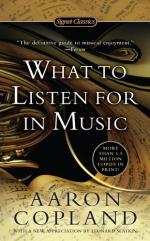|
This section contains 419 words (approx. 2 pages at 400 words per page) |

|
What to Listen for in Music Summary & Study Guide Description
What to Listen for in Music Summary & Study Guide includes comprehensive information and analysis to help you understand the book. This study guide contains the following sections:
This detailed literature summary also contains Topics for Discussion on What to Listen for in Music by Aaron Copland.
"What to Listen for in Music" is a book that is considered to be a classic among musicians and music lovers, whether they are self-taught or formally trained. Aaron Copland was a world renowned composer, musician, and teacher. This book was developed through a series of lectures Copland gave at an innovative charter school in New York City, called the New School. Although the lectures began in 1937 and the book was published in 1939, Copland's definitions, directions and advice are still as pertinent today as they were back then. While many would say that music has changed dramatically since the book's most recent revision in 1957, Copland's overall observations about the direction of music, particularly contemporary music, are dead on.
Although Copland was an expert in his field, "What to Listen for in Music" is not an academic treatise by any means. In fact, the author makes it perfectly clear in the first part of the book that one does not need to be an expert or even highly skilled in music in order to listen and appreciate what one hears. Copland's tone is that of a fellow music lover who has had more experience in this area and is eager to share his knowledge and advice. Copland's approach is utterly refreshing and friendly, encouraging the reader to continue on and soak up as much information as possible. There are some parts that are a bit laborious and technical. This is often necessary so that the reader can understand the meaning of certain aspects of music, such as harmony, physical texture, and specific musical forms such as fugue and basso ostinato.
The author does not assert or expect that after the completion of the book the blossoming music listener will suddenly recognize every form or function of music. Copland makes it very clear that the only way to truly learned to appreciate music, beyond basic knowledge, is to listen. Listening repeatedly to any form of music will increase one's awareness, and even if it doesn't come at first, the listener will begin to identify composer's specific style.
Another very crucial point Copland makes is that people tend to approach different kinds of music with the same year. This is a mistake. One cannot compare the works of the great masters such as Bach to more contemporary composers such as Roy Clark or Bono.
Overall, "What to Listen for in Music" is a must read for anyone, regardless of experience, who wishes to appreciate music in its entirety.
Read more from the Study Guide
|
This section contains 419 words (approx. 2 pages at 400 words per page) |

|



